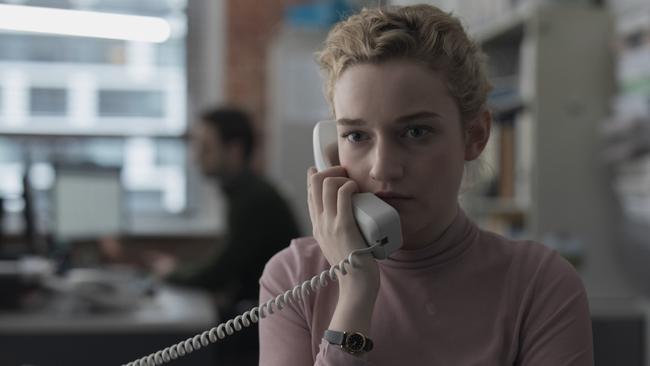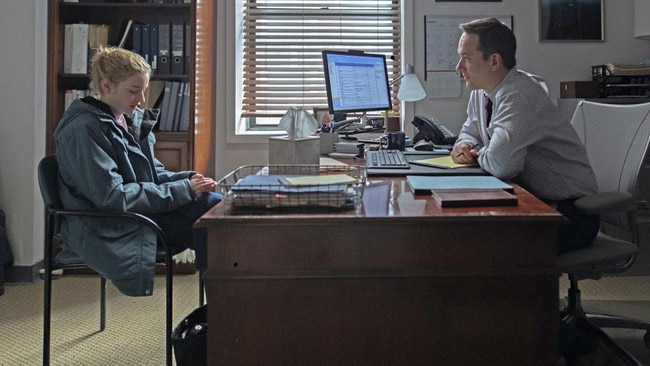
The #MeToo movement was the undercurrent of two superb shows last year: the movie Bombshell and the TV series The Loudest Voice, each centred on the disgraced and now dead Fox News boss Roger Ailes, an accused sexual predator. The ghost in the background of each was movie mogul Harvey Weinstein, who had been charged with rape and sexual assault but not convicted. He was found guilty in February and sent to jail.
The Weinstein case inspired Australian filmmaker Kitty Green, who was doing research in the US at the time. The maker of three documentaries, including one on the murdered American child beauty queen JonBenet Ramsey, she decided to turn her lens to the soon (and still) boiling issue of gender bias, male power and female (and male) consent in the workplace.
The result is not a documentary but her debut feature film, The Assistant, and it is riveting. Structurally it is far different to Bombshell and The Loudest Voice, but in terms of power it is at least their equal.
Green, writer and director, presents a near-perfect paradox: this movie is quiet and loud. The screaming we do not hear is inside the main character’s head, and inside ours.
This alone is a compelling reminder that direct and indirect complicity — enabling and facilitating, or silence and looking the other way — is one of the reasons some people got away with so much for so long.
“I wouldn’t sit there,” a besuited man says to his besuited colleagues as they enter an office. “Never sit on the couch.” It looks a bit like a moment from Mad Men.
They laugh a little awkwardly but not awkwardly enough. We’re in on the joke because a bit earlier we saw the assistant of the title, Julia (the outstanding Julia Garner), don rubber gloves to sponge down that couch.

The owner of that office is not named. Nor is he seen, except in one scene where we catch a shadowy glimpse of him. We do hear him a few times, yelling expletive-ridden orders and remonstrations down the phone line to Julia. We hear him called the chairman.
This is a movie where we know more than we see. Because of the headlines surrounding the Weinstein case, we know this is the office of a moviemaker. Yet the word film is mentioned only once, as Julia accompanies a new, beautiful assistant to the hotel room that has been booked for her. This new assistant says the chairman met her when she was waitressing, but adds that she has an interest in movies. Later, when Julia shows her how to use the office phones, she takes her through the chairman’s speed dial numbers. His wife is No 6.
There’s a similar scene where Julia is in the lift with a man who looks like an actor. He’s looking at his phone screen, not at her. When the lift door opens and they exit, what happens has no dialogue but speaks volumes.
READ MORE: The Trip to Greece review: odyssey with a comical twist | Joan’s arc of movie triumphs: my memories of a true Hollywood star
This goes to the genius of Green’s approach. She relies on us to join the dots. The 90-minute movie is set over one day, a Monday, at the office in Manhattan. Julia, who we later learn has been in the job for only five weeks, arrives when it’s still dark. She does the usual office chores such as photocopying and opening mail. She also does what she later calls “tidying up”. She finds an earring on the floor of the chairman’s office.
In an insightful interview with Philippa Hawker, published in this newspaper on May 2, Green said she was not interested in showing the “crazy or extraordinary”. Unlike Bombshell or The Loudest Voice, we do not see glamorous TV stars doing their on-screen jobs. Green said she was more interested in showing the “ordinary and the banal”. She excels at doing so, helped by a remarkable performance by Garner, whom viewers may know as the young, intelligent redneck Ruth in the magnificent TV series Ozark, for which she has won an Emmy.
Julia shares her office space with two male assistants (Noah Robbins and Jon Orsini), who are not unpleasant. It’s clear, though, that she is the junior. She books flights, hotels, cars. She takes the angry calls from the chairman’s wife. She uses the phrase she has been told to use: the chairman’s “in a personal” and can’t be disturbed. The chairman’s office is just behind them.
That we cannot see the chairman means he exists where our imagination takes him. We do not have the proof we have with the on-screen Ailes (John Lithgow in Bombshell; Russell Crowe in The Loudest Voice). Yet we, too, can see the dots, just as Julia does, just as everybody does. They’re impossible not to see, but that doesn’t mean they can’t be ignored. The chairman is a minotaur without a maze.
Watching everything unfold through Julia’s eyes made me think about an alternative version of The Sopranos where Tony Soprano is never seen and the perspective is that of one of his offsiders; Big Pussy, say. Fans will know what happened to him.
There’s a long, still scene that goes to the core of this movie. Julia goes to see the human resources boss (a superb Matthew Macfadyen). He is polite and professional. She tells him about the dots. His response is telling.
There are few moments when Julia is not in the office. Here Green and cinematographer Michael Latham put to imposing use the pared-back effect that filters through the movie. As Julia walks down the Manhattan street the camera remains still. We see her from behind, walking away, becoming smaller and smaller.
The Assistant could be described as a slow-burn drama, but I think it’s something a little more complex than that. The tension is there from the first frame. It does accelerate or slow down. It does not explode. It’s just there, all the time. You might describe it as walking on eggshells. You have to watch every step you take, every moment of every day.
Julia sends two emails to the chairman after he berates her. Each time she says: “I will not let you down again.” What we know will happen, at Julia’s hands or someone else’s, is that one day “down” will be changed to “do it”. This movie is an extraordinary one-day snapshot of why that word had to change.
The Assistant (M)
Available now from Foxtel On Demand Available from June 10 on streaming services including Google Play, iTunes, Fetch TV, Telstra Bigpond, Sony, Microsoft and Quickflix.
★★★★½



